We’re going to talk about the Georgia Food Safety Law today, which is important. It is especially important to the people in a little town out in the country. The urbanites don’t think about these things much. As usual in this case we’re going to try to steer down the political middle, but there are some cans of worms that we’re going to open. Sorry (not sorry).
Disclaimer
Since we’re not trained lawyers, nothing we say in here should be construed as legal advice. We’ll let you know what areas of knowledge we’re authoritative at. Actually, we’re authoritative on the topic of Little Southern Towns, and also authoritative on the Art of Breakfast, both of which we are published on.
This falls under the general category of Human Scale Living. Also, we’re authoritative on Bed and Breakfast Life, on which we’ve written the books, which makes us “authors.”
Plus a couple of these laws apply peripherally to us. Our opinion of them is “nuanced.”

The Georgia Food Safety Law
We’ve linked this thing below.
Some of it is very well known, and makes a lot of sense. Some of it, not so much. If you live in a rural area, you don’t really think about it very much, but there is an underlying logic to it.
Why the Georgia Food Safety Law is Important Right Now
Say, hypothetically, the food supply system is hit by some catastrophe. You decide “no problem we live 400 yards from a chicken farmer, we’ll just go over there and buy some eggs.”
But, according to the law above, you may not be able to do this quite so easily. In fact, if the farmer is not careful, he or she may be subject to a felony.
The Georgia Food Safety Law is about Retail Food Regulations
Everybody sort of agrees that parts of this law are really good, namely the part about regulating restaurants. This part of the law requires inspections and that kind of thing so as to give third party assurance that the crew knows what they are doing and are operating in a sanitary way.
We see the friendly certificate in front of the place with the sanitation and food handling score. Good stuff. We can’t have foodborne illnesses. Is this an opportunity for corruption? Who is the inspector exactly? Well, we are sure that the Morgan County people that do this are wonderful, but there is an opportunity for corruption.
Are you infringing on the civil rights of a restaurant person? You’re requiring him or her to get inspected, and follow food handling laws. Yes, in a way, a little. But for the common good, since there could be hundreds of people sickened by this, it makes some sense. You can’t completely rely on market forces to correct this stuff, even if there are some flaws in the system.
The Bed and Breakfast Rules
Just in case it comes up, we believe in these. Morgan County has some specific rules for this which we support. We are giving away some of our freedom to rent out an empty room or two in exchange for some third party regulation.
What this does is make it so that the general public has some assurances. There were inspections, and safety standards, and fire extinguisher requirements. We actually support this because some knowledgeable person has inspected the place and focuses on safety and other areas of concern. Since we are not expert on construction or fire safety we are happy to go along with this.
We want people to be safe at our place. That also goes for food safety, for which we have some rules. We actually want people to be safe all over Morgan County, including some of the low rent places. No one wants the place to get a bad reputation.
By the way, the same law that regulates this is also supposed to keep someone from erecting a giant toxic factory across the road from us. Just Sayin’.
Food Trucks
Here is the story: You’re required to have a license. You need to be inspected, know something about handling and storing food, and also have a “base of operations.” This “base” is where you load your food truck up with water, for washing, and also for dumping any waste water. It’s probably not the greatest thing if you back your food truck up to the local creek and dump the holding tank in there.
It’s also probably a good idea if your employees don’t have communicable diseases, and there’s a medical form for that.
This “base” can be your house, unless the local zoning ordinances forbid you from having it at your place.
The state has recently relaxed some of the regulations in that your “base” no longer needs to be in the same county as your food truck. That means if you want to have an Atlanta food truck, your Morgan County “base” and “permit” are okay, because they now say so.
The previous regulations were considered annoying because if your food truck was in someplace like Social Circle, which is at the intersection of four different counties, you had to jump through four sets of hoops.
There are a couple of these in Morgan County. One of them is “Scoops” which makes sense because they are retailers anyway, and have a “base.”
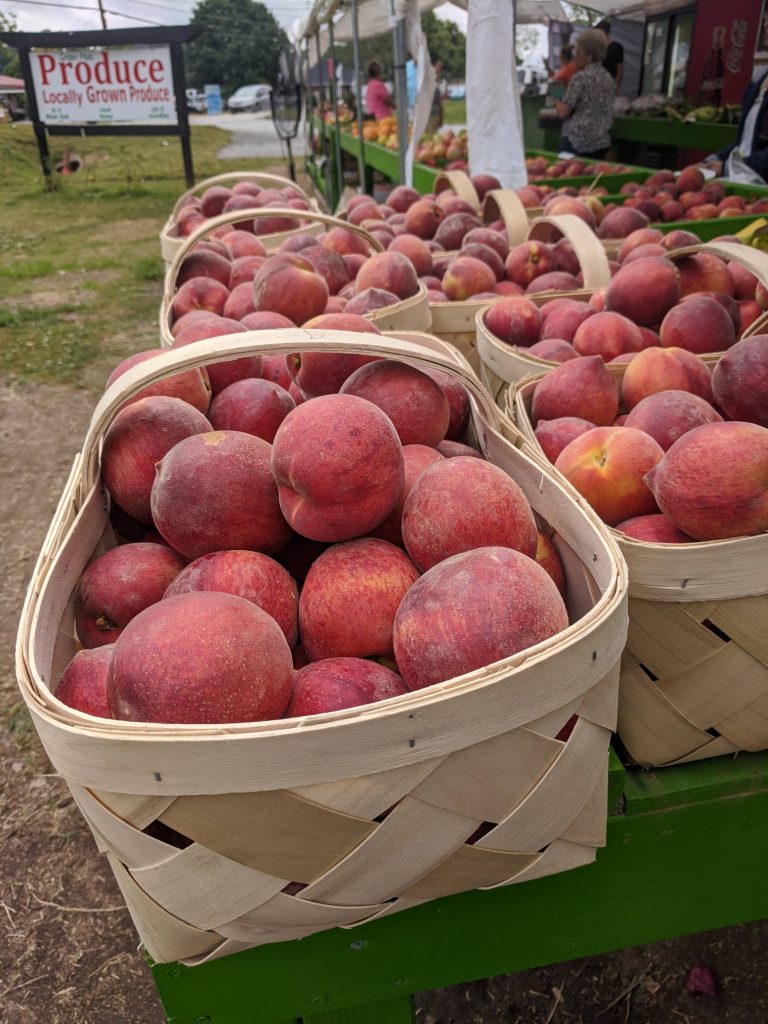
The Farmer’s Market and Cottage Farms
These things have a bit of a connection in that it differentiates between “high risk” and “low risk” foods. There are also some rules around “processing.”
In either case, “cottage farms” are allowed to sell fruits and veggies, and also baked goods like cookies, as long as you have a food license. You also need to have a business license in your county. Forget steaks, unless they were processed and packaged in a licensed kitchen, and labelled as such.
Also, you’re not allowed to have “processed” foods, as defined by anything including slicing. So, we were having a nice conversation with the Sprout Lady down at Farmview the other day. She was saying that she can’t sell us a half of a flat of sprouts because she can’t cut it. This is why. Cutting is considered “processing.”
The little kids’ lemonade stand, by the way, is illegal in this case. She probably hasn’t had a Hepatitis test, which is requirement.
The law also calls for Farmer’s Markets having some kind of hand washing and basic sanitation facilities.
But, if it makes you feel any better, cookies are okay.
Here’s a thought question. Does anybody remember the Rutledge Peanut Lady? Well, in theory, she was supposed to have some kind of license, and hand washing, and waste disposal as well. Boiled peanuts? Processed.
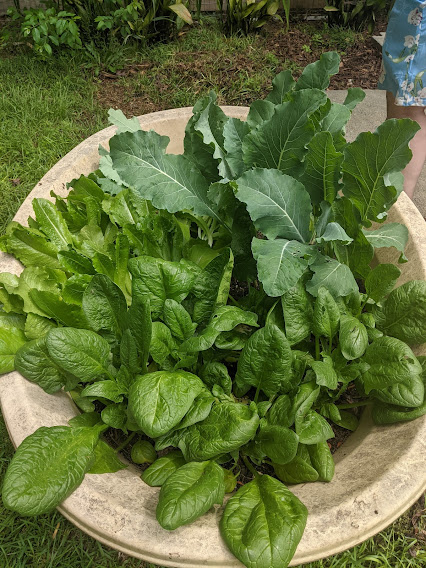
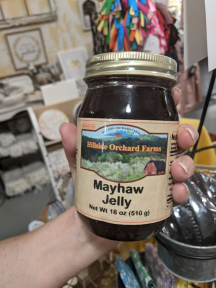
Jams and Jellies
Well, not to put too fine a point on it, but you can sell all of these you want as long as they were produced in a licensed, certified processing operation. But, you can’t really sell your home canned pickles, sorry.
Selling Eggs
According to the link below, in order to sell chicken eggs in Georgia, you’re required to follow the Georgia Egg Law. In addition to the food handling and business licenses, you need to be a “certified egg candler.” You can get this for free, apparently, through the Georgia Department of Agriculture.
You also need to follow the USDA egg guidelines on grading, and weights.
Also, you can forget knocking on the door out behind The Sinclair and offering to sell them a few of your farm fresh eggs. Part of this law requires any resales to be through a licensed wholesaler. The underlying rationale is that these eggs need to be trackable to the source. If there is some sort of “food contamination issue” the FDA needs to be able to track the issue to the source, if it can be found.
Also, this requires eggs to be refrigerated to under 45 degrees. This has an element of humor to it, because European eggs are OK to be unrefrigerated.
Do Eggs Need to be Refrigerated?
While we’re on the topic:
There is disagreement on the question of whether an egg needs to be refrigerated.
The main issue on egg refrigeration is salmonella. In the US there is a requirement for “industrial eggs” to be washed and sprayed down with a chemical disinfectant to keep down the contamination. UK egg farmers, as well as a lot of other places, the strategy is to keep salmonella out of the flock by vaccinating the chickens occasionally. In the EU, it’s actually illegal to sell eggs that have been disinfected.
If left intact, the egg cuticle (goo that is on the outside of the egg) forms a natural barrier against bacteria. So in those places, the strategy is to leave them unwashed. They don’t need to be refrigerated.
According to the second link below, this all started in the 1970’s when the US started to export eggs.
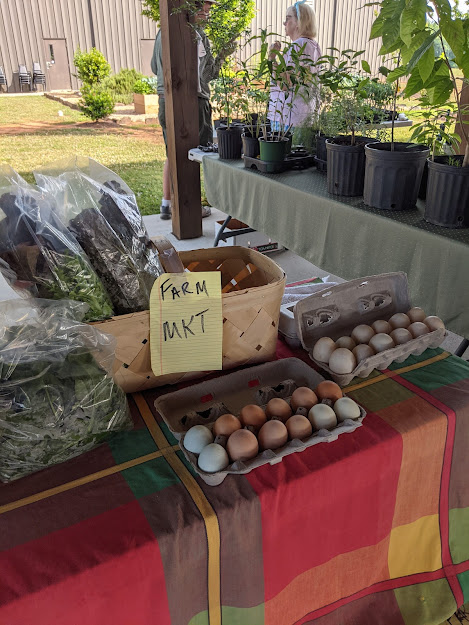
Selling Live Chickens
If you’re selling chickens, the rule depends on what the buyer is going to do with them. It also depends on how many chickens you’re talking about.
If you buy a lot of chickens, and then flip them to someone else, that makes you a “dealer” and you need to get a “dealer license.” The idea is that you need to know where you got the chickens, and keep track of who you sold them to. The reason for this is because of chicken diseases, like the Bird Flu which is now terrible up in the Midwest.
In fact, as of February this year there was a ban on “chicken shows” to cut down on the spread of these diseases. Who knew there was such a thing as a “chicken show?”
There is an app for this. The “North Georgia Fair” bantam show is still on, despite the cancellations.
Selling Baby Chicks to somebody
Okay, what about Tractor Supply? Those guys sell baby chicks in a big livestock feeder this time of year, and turkeys later on.
Well they’re technically livestock dealers. They’re not allowed to bring in chicks across the state line. They’re also required to keep track of the hatchery where they were hatched. They need to have a “dealer license.”
In theory, they’re also required to keep track of who they sold them to, and even the license number of the car they were used to transport them in, just in case there is a disease outbreak.
If the agriculture inspector finds out that your flock is contaminated, they’re allowed to quarantine your birds, and I suppose track down everybody you sold them to.
They seem to be terrified of a disease called Pullorum, which according to the link below, is “just” salmonella.
Selling Chickens to Somebody
Well, in Georgia, a famous chicken state, a farmer can actually sell less than 1000 “processed” chickens a year at farmer’s markets.
All you have to do is be in compliance with the USDA Poultry Inspection Rules. You have to be licensed, have your employees documented to be free of cooties, and then process your chickens in an “inspected facility.” This is a place where all of the food surfaces are designed to be easily cleaned. There’s a requirement for you to submit a floor plan of your “processing area.”
You also have to have an inspection facility, along with needed lighting and temperature controls. You need to request that your facility be inspected and have a HACCP plan, which means access control, pest control, location of floor drains, and the whole nine yards.
Also there are a lot of packaging labeling requirements.
So you’re not going to be able to go out and butcher your chicken on a stump in the backyard, because of the risk of safety issues.
What if you have more than 1000 chickens?
Well according to the link below, if you have up to 20,000 chickens, you can take them to a ” USDA approved processor” to get them processed.
But, come to find out there aren’t any of these in Georgia. So, you’ll have to haul them across a state line. That means you’re subject to a lot of other rules about transporting livestock, and also, the rules of whatever that state is.
If you have more than 20,000 chickens, you’re required to work with an “integrator” who is one of these big processors that “integrates” your flock into #1 at Chick Fil A. These “integrators” usually own the flocks themselves, and just pay you, the farmer, to feed them out. You can take advantage of their guidance as to how to do this without spreading diseases.
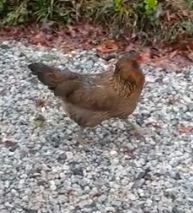
Other Livestock
Well, if the animal is alive, you are good. You’re allowed to sell a live cow to someone.
But, according to the link below, if you butcher that same cow, onsite, you’re illegal. You have to take it to a “licensed and approved processing facility” and have someone cut it up for you. You’re required to show receipts for separate transactions.
If you then intend to sell the meat at a Farmer’s Market, for example, you’re required to have the same business and food licenses, and have a mobile meat sales license. There are inspection requirements if you are selling it from a fixed location. That place has to be inspected as well. If you think you’re selling it to someone across the state line, you’re subject to USDA inspections, and the inspections from that other state, whatever it is.
The “Meat Inspection Rule” is 140 pages long. I have linked it below.
I would suspect that the pig rules are the same or worse.
Dairy Products
On the topic of milk, a bit of a miracle has happened. Georgia has passed a law to the effect that small farmers in Georgia can sell “raw milk” i.e. “from the cow to your kid” starting July 1, 2023.
There was enough of an outcry from people that like this idea that it managed to get through the legislature.
The milk must be labeled “pet milk only” but at least you can buy it directly from the farmer.
Otherwise, you’re subject to the “pasturized milk ordinance” which I’ve linked below, which is only 430 pages, and comes to you via the FDA and the USDA.
Honey
According to the link below, a beekeeper is actually allowed to sell honey from their own hives, either door to door, or from their front porch without a license.
But if you want to sell it at a store, it needs to be processed under friendly conditions and be subject to the food safety laws, including your food handling licensing regulations.
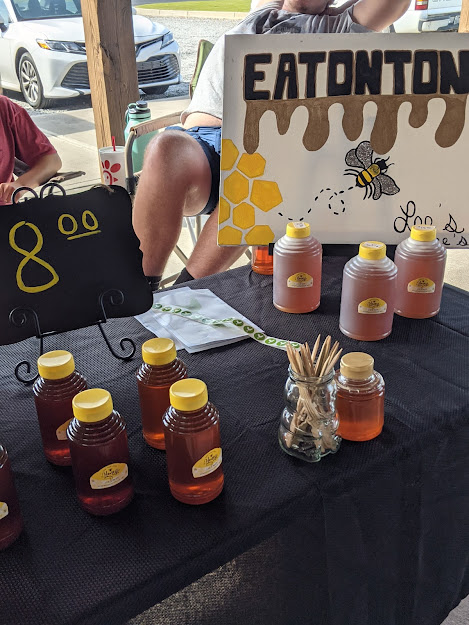
So, how is all of this working?
Here’s a graph from data captured by the CDC of incidences of salmonella infantis in the population. I have linked a graph below that gives the data back to 1960, and you can reach the same conclusion.
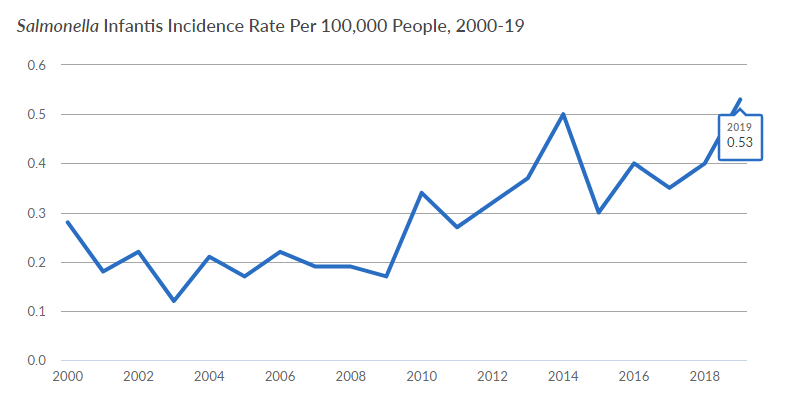
There are better graphs elsewhere, but in a general way, this is what happened. Foodborne diseases are steadily increasing.
How on earth did that happen? With all of these regulations, we should be living in disease-free utopia, right?
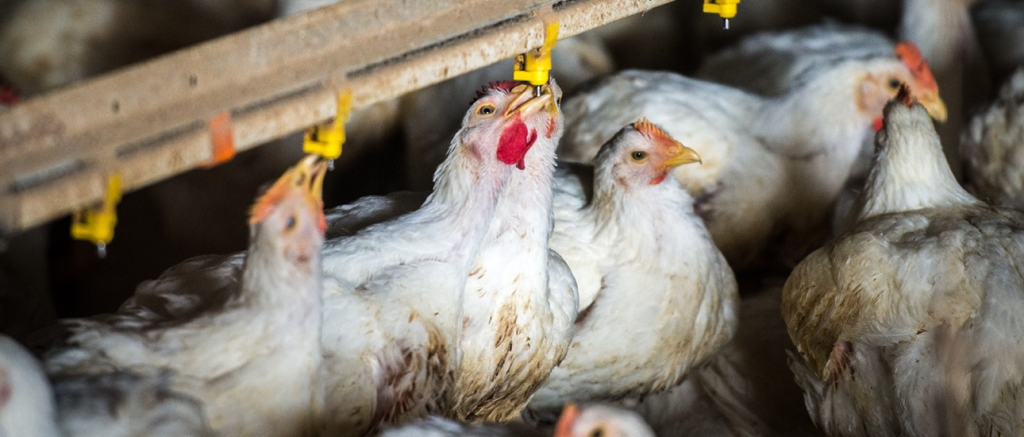
Unintended Circumstances
Well much of this is opinion, and as in all cases of opinion, you are invited to visit, and bring your data. We will share sacraments, and have a civilized discussion about this.
Concentration of the Food Industry
The fellow they interviewed about the new Dairy rule said it best. The first effect of all of the rules is that the small farmers and others are basically excluded from the system. The production is concentrated into fewer and fewer huge operations.
The benefit of this is abundant cheap food. At least up until now that has been the case. But there’s no doubt about the shrinking number of small farmers whose livelihood is illegal.
Dependence on Diesel Fuel and Hormones
It’s not hard to figure out what happens next. The super-efficient large scale operations have a cost advantage. It becomes literally cheaper to raise factory chickens in the Factory Chicken state, and truck them to Georgia using diesel fuel.
So you get scenes like that one above, when these poor birds are crowded together, sharing diseases and getting it into the food supply.
And when there is a foodborne disease outbreak, the reaction is “more laws” rather than addressing the root cause, which is too much concentration of food production into fewer and fewer huge food operations.
People Don’t Understand Food
There is an interesting article below that points out that in 1940, 25% of the population was engaged in agriculture. Nowadays it is under 2% and that amount is shrinking.
Both ends of the farming bell curve are concerned about this.
The Pro-GMO people are saying “of course you can’t ban GMO because if you do, food costs will go through the roof”. The Animal Welfare people are saying “eating animals is immoral.” There is a third group that has no idea where a McNugget comes from.
All of this leads to terrible choices and gridlock when it comes to fixing it.
There is Potential for Abuse
You can see a future like there is in some places where the rules are selectively enforced, and weaponized. The Rutledge Peanut Lady was probably a case in point.
You want another example? It is pretty common for pop-up BBQ places to spring up in the most violent part of Atlanta. Is some cop going to go down and enforce the anti-BBQ rules in a place where there is violence? Unlikely.
Anyway, there is a lot of question, under the current system, about whether the inspection process is all that good.
Surely, we couldn’t be put into a situation where there are food security issues, despite living in an area of vast agricultural abundance? Where could such a thing like that happen?
Oh, yeah.
https://www.history.com/topics/immigration/irish-potato-famine
It Screws Up the Community
There is a fellow, Nick Johnson, who goes around sort of like we do, to try to explore places.
Among these places is a section of North Carolina, which he calls the “Rot Belt.”
We have touched on this sort of thing repeatedly in a number of our “Little Southern Towns” blogs, and in the book below.
What happens in essence is that if the little local farmers don’t have access to marketing their products, because of the requirements, they’ll hit the road.
The county they are talking about in this video is exactly like some of the places we have visited in this area, where the population was vibrant in about 1960 and then been in slow decline.
This particular video interviews a prof from UNC who is approaching it from one political point of view that specifically mentions some of these rules as a reason for these communities dying out.
There is one more thing.
Ah, well our Regenerative Farming Hero, Mr. Joel Salatin, has a point of view on this.
He is our hero in that to prove a point, he actually has a little regenerative farming empire. He managed to get a lot of egg business in some of the swanky places in Washington DC. His empire includes chicken processing, and a licensed, inspected abattoir. He has also expanded to rabbits and other animals, and does so without antibiotics or hormones. He jumped through all of the hoops, and is now influencing the politicians in Virginia on some of these issues.
There is the idea that his farm spreads out the animals, and rotates them so as to avoid disease. He doesn’t have disease outbreaks.
As he points out, the above rules don’t apply if you give the food away. Therefore, it’s not about food safety, it’s about money. Who knew?
So who voted for all of this?
You did. You voted with your debit card, by buying the low-cost food and food by products that were sold in the big box places uptown because it was cheaper.
The consumers have a choice, and tend to choose cheap. That’s the primary reason that the supporters of the current system give for even more laws. People like it. They complain when food prices go up.
The other fun statistic Joel Salatin gives is that in 1960, we were spending about 18% of our disposable income in 1960 on food, and that has shrunk to about 10% now.
At exactly the same time, the per capita medical expense has about gone up by 6X since 1970. We’re a fatter, sicker population.
So what really happened was that the nation shifted the cost from the food system to the health care system. Who could have possibly predicted that?
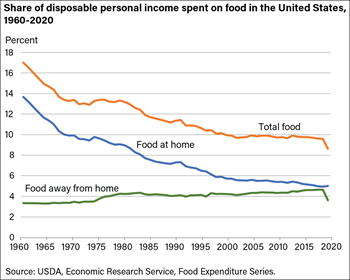
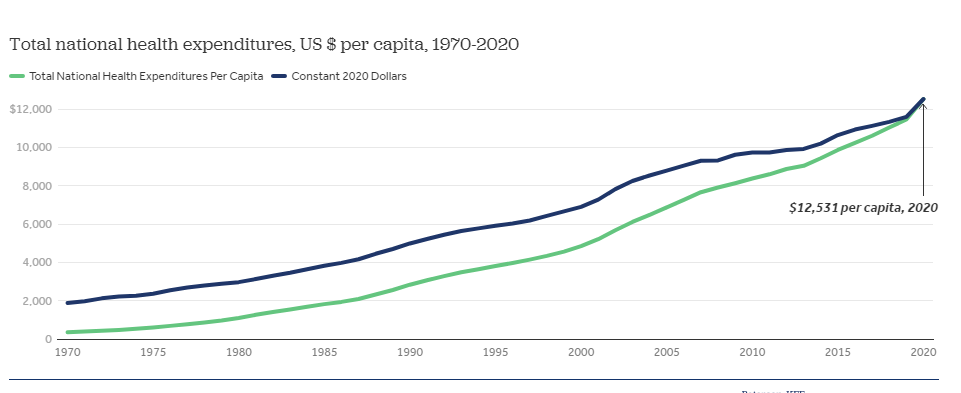
So now what?
Well, the offer still stands. If you want to come and sit around the veranda, and share your point of view along with some dangerous eggs, and some of the sacraments, we will entertain that.
In a month or two, things being what they are, you may be converted to the human-scale version of agriculture. We will see. Until then, when your local politician comes to your door to vote for him or her, engage them in this topic and we can see if they are among the ignorant.
Links and References
Georgia Food Safety Law
https://www.agr.georgia.gov/rules-regulations-food-safety-division.aspx
Morgan County Zoning Ordinances
https://www.morganga.org/322/Code-Enf-Ordinance-Development-Regulatio
Food Truck Law
https://dph.georgia.gov/document/document/mobile-food-frequency-asked-questions/download
https://www.gpb.org/news/2022/03/18/georgia-house-passes-bill-allow-food-trucks-operate-statewide
Entrepreneur article
https://www.entrepreneur.com/article/233386
Scoops Food Truck
Georgia Egg Law
Georgia Egg Law
http://agr.georgia.gov/Data/Sites/1/media/ag_consumerprotection/administration/files/georgiaegglawandsupportingregulations.pdf
Egg Refrigeration
Egg Refrigeration
Meat Inspections
Meat Inspection Rule
Selling Live Chickens
https://agr.georgia.gov/poultry-dealer-broker-app.aspx
https://rules.sos.ga.gov/gac/40-13-10
North Georgia Bantam Show
https://www.poultryshowcentral.com/North_Georgia_Fair.html
Live Chicken Sales
https://times-herald.com/news/2022/02/poultry-show-returns-friday-saturday
https://agr.georgia.gov/poultry-dealer-broker-app.aspx
Pullorum
Honey
Dairy
Pasteurized Milk Ordinance
http://agr.georgia.gov/Data/Sites/1/media/ag_consumerprotection/dairy/files/PMO-2013.pdf
Salmonella Data
https://www.statista.com/statistics/186681/new-cases-of-salmonellosis-in-the-us-since-1960/
Food Ignorance
Per Capita Food Expense
Per Capita Health Expense
![]()
